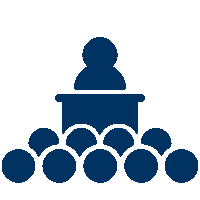Call for Sessions
Organize and Lead a 2024 Collaborative Session
SUBMISSION CLOSED ON 12 DECEMBER
The Call for Sessions is your opportunity to shape the content of the 2024 ASCEND event. Your submissions will form the foundation of the event program and drive the conversations and collaboration opportunities for participants.
By design, the 2024 ASCEND Call for Sessions is written at a high level to promote greater diversity and freedom of important content to be considered from across the space ecosystem. The goal of the Call for Sessions is to collect input from individuals, universities, companies, agencies, and adjacent partners on the topics and challenges that matter to the global ASCEND community.
Submissions should address one of the six AIAA space domain priorities outlined below in a meaningful, collaborative way. Ideas should be relevant to the diverse ASCEND audience at the intersection of space sectors – civil, commercial, academic, scientific, and national security. ASCEND participants are leaders, educators, engineers, students, and researchers that come together each year to accelerate the building of our sustainable off-world future. These audiences and motivations should be reflected in your submission!
Session ideas should also be multi-disciplinary and diverse in perspectives in order to spur meaningful conversations. Tangible outcomes from these sessions are critical to the goals of ASCEND so please be sure to clearly define what you hope to achieve through your proposed session and what the ASCEND community will take away from the experience.
Submitted sessions should promote continuing conversations where public and private sector voices proactively work together to develop deeper understanding of issues, to achieve common objectives and outcomes, to solve shared challenges, and to leverage collective opportunities in an environment of trust, respect, empathy, and openness.
Key Dates and Deadlines
Questions?
If you have questions about submission topics and our interdisciplinary approach, please reach out to:
- Julie Van Kleeck | AIAA Space Domain Lead and ASCEND Executive Producer
- Craig Day | AIAA ASCEND Program Executive
- Caroline Emmert | AIAA ASCEND Forum Content Manager
Session Formats
Step One: Pick One Format
A classic debate where a provocative question is posed and both sides are represented.
A moderated discussion between a small group of experts with audience participation through Q&A.
An interactive participation by attendees and roundtable facilitators to collaboratively probe issues and leverage collective experiences to develop a deeper, shared understanding.
A gathering of a community around a central topic for discussion and planning that includes high levels of attendee participation in open discussion.
An interactive learning session that includes the participation of attendees and may award certification or continuing education credits.
A collaborative session in which attendees are dispersed into small groups to discuss a central topic/theme, focused on developing outcomes, and capturing the collective wisdom/ideation.
Session Submission Requirements
Title
- Your title should convey to forum organizers and attendees exactly what your session is about.
Short Session Description
- Provide as much specificity as possible. Organizers will use your description to determine if and where your idea fits in the overall program. Please do not use this section to include names of potential speakers of your session.
Contact Information
- Tell us who you are, where you’re from, and how to connect with you. If your session is accepted for inclusion in 2024 ASCEND, this information will be used to contact you.
Session Length
- Longer is not always better. Session lengths will be determined based on the ideas received and the overall flow of the program. Think about how much time is absolutely needed to convey the ideas and drive the outcomes you desire. If you session is accepted, duration may differ from what is requested.
Extended Description
- This is a longer, more in-depth description of the background and details of the proposal that will be used only for the review of the proposal if needed. This is a good place to include the types or specific names of speakers you are envisioning for your submission. Diverse perspectives are critical at ASCEND so please reflect that here if you have speaker ideas.
Session Goals and Outcomes
- This is where the rubber meets the road. Think through what will come out of this conversation at ASCEND – is it a whitepaper, formation of a new committee or working group, an actionable set of priorities, something else? If we revisit your session a year later, what would have been accomplished in the interim?
General Submission Requirements
- Participant Contact Information – Full name, institution, phone, and email address for all session organizers and proposed speakers.
- Submission Details – Title, session format, session topic, represented industries of each panelist or participant.
- Session Description – Detailed description including the contradictory statements on the topic, and the list of participants and the industry perspective they represent.
Please Note
- All proposed sessions should strive to include diverse representation of both demographics and perspectives.
- All collaborative session participants are required to be registered and present in-person at ASCEND, and organizers will receive information about registration options upon acceptance.
Session Topics
Space Traffic Management/ Coordination ↓
Sessions are invited that offer non-technology-based methods as well (policy, best practices, lessons learned, etc.) that assess the appropriate roles of organizations (international bodies, national governments, and nongovernmental organizations, etc.) in providing space situational awareness, traffic management, and control services. Regulatory clarity regarding the on-orbit authorities of government agencies – as-yet largely undefined – is a timely subject. Attention to evolving regulatory frameworks and priority preferences for air traffic operations amidst the increasing launch/reentry cadence are of particular interest.
Submissions may relate to items, such as:
- Space access and safe operations from initial launch through mission completion/return
- Regulatory requirements and methods to manage certification of Commercial Launch Systems
- Orbital debris identification; notification; management
- Autonomous space domain tracking and reporting tools
Expanding and Evolving the Space Economy ↓
Recent analyses suggest that a fully developed space-based economy is poised to dwarf the current economic activities on Earth. Realizing the full promise and possibility of that growth—a forecasted $1 trillion globally by 2040—demands bringing together business leaders, academics, innovators, investors, technical experts, government stakeholders and decision-makers to envision, design, and build the future of space commerce, together. ASCEND seek sessions that may dig into these topics to support this community and help inspire new approaches and lessons learned from relevant markets.
Submissions may relate to items, such as:
- Emerging commercial services and capabilities in progress (like On-Orbit Servicing)
- Market research products
- Business plans and opportunities to enable synergistic implementation and exploitation.
- Major cost drivers and potential solutions (for establishment and expansion of space commerce)
- Strategies and success stories for public awareness
Space Exploration and Infrastructure: Exploring, Living and Working in Space ↓
Throughout human history, we have pondered the great mysteries, such as the formation of the universe and our solar system, the existence of life on other planets, and how we can better understand the complex systems of the Earth. Within the past century, however, advances in space technology have allowed us to make great leaps in our understanding of these and other scientific frontiers.
As we seek to further accelerate the growth of the space economy and make strides toward our off-world future, it is imperative that we leverage the resultant new technologies and capabilities to expand our understanding of the solar system and the universe. We must address the most crucial scientific questions that remain unanswered. This topic focuses attention on these questions, as prioritized by the scientific community in publications, such as the U.S. NASA-requested decadal surveys, and to identify opportunities and challenges that can be addressed through increased activities and human presence in space.
Space Security and Protection ↓
ASCEND seeks dialogue-generating panels and workshops to foster outcomes shaping the future utilization and protection of space. Space activities support all aspects of daily life, thus the overlap between efforts to produce value in space, efforts to manage the increasingly crowded space domain, and efforts to protect our ability to operate freely in space form a nexus for the space community.
ASCEND wishes to form sessions around space-based capabilities, sensor and system technologies, space traffic management, space domain awareness, and the protection of space assets. Content covering cislunar ventures provides insights into the growth beyond the traditional Earth orbit focus. Additionally, experiences in commercialization partnerships and public private partnerships inform the evolution and approaches to providing the systems necessary to protect, defend, and enable the continued open use of space for the benefit of all humankind in an environment that is becoming increasingly crowded, dangerous, and essential.
Space and Sustainability ↓
Space and Society, Education, and Workforce ↓
The recent explosive growth in the commercial space industry has led to one of the most dynamic and exciting periods of expansion of the aerospace workforce. However, this vitality and growth has not come without challenges: workforce retention and management has become a first-order concern, prevalent across the industry. At the same time, our industry is becoming increasingly conscious of the critical importance of diversity and inclusion in the workplace and in our schools, and yet challenged to impart significant traction in this regard. Emergent technological needs in areas like artificial intelligence, human-robot teaming and cybersecurity are driving our system requirements and capabilities, resulting in significant changes in the educational needs of modern-day aerospace engineers. ASCEND seeks sessions to shed light on all these issues and help our industry wrap its arms around these huge challenges.
Submissions may relate to items, such as:
- Educational approaches and curriculum strategies
- Workforce development, retention, and management
- Outreach initiatives and programs
- Diversity, advocacy, equality, and inclusion
- Synergistic approaches by academia, government, and industry




